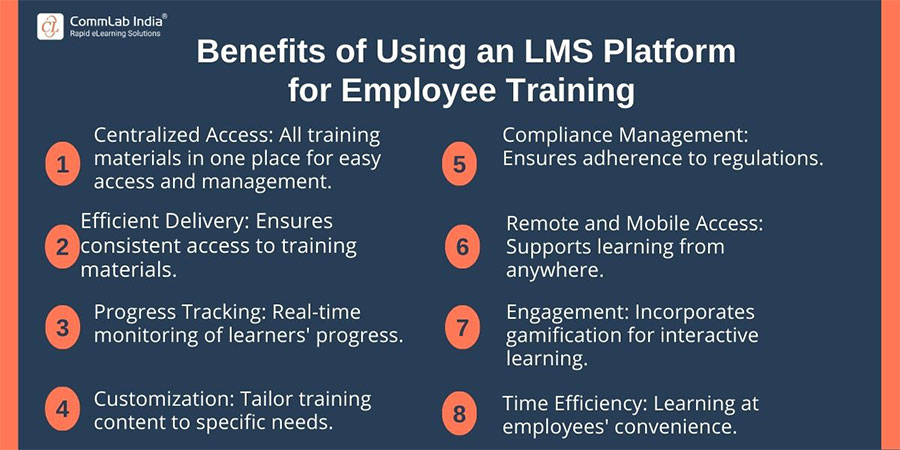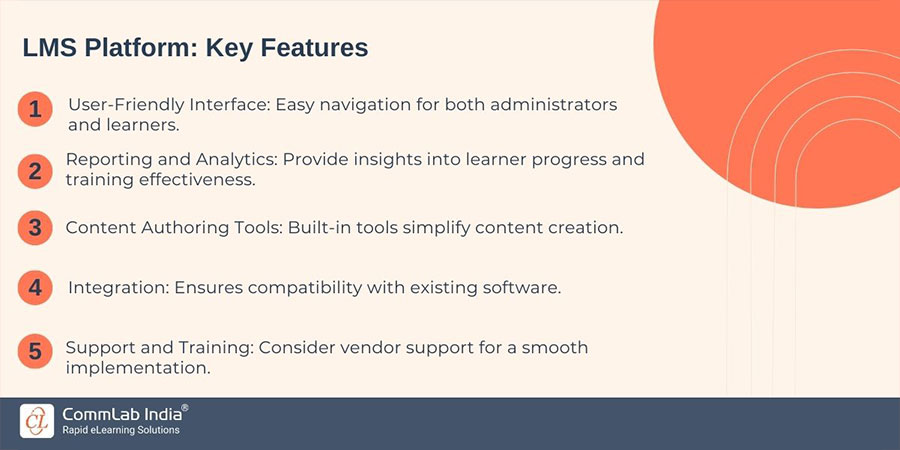A Review of Top LMS Platforms for Employee Training in 2023
Trying to choose an LMS platform for 2024? Well, here’s a list of the best LMS platforms of 2023 which will also do great in 2024 and beyond.

We are living in a dynamic work environment where employee training and development have never been more critical! As organizations strive to stay competitive and meet the evolving needs of their workforce, Learning Management Systems (LMS) are playing a pivotal role in facilitating effective training programs. The LMS landscape is ever-evolving, with new features, innovations, and providers constantly emerging. To help you navigate this terrain, we've compiled a review of the top LMS platforms for employee training in 2023.
Why is it Important to Have an LMS for Employee Training?
An LMS (Learning Management System) streamlines and enhances employee training by offering a centralized platform for course delivery, tracking progress, and assessing learning outcomes, resulting in efficient, effective, and scalable training programs.
Benefits of Using an LMS Platform for Employee Training
A Learning Management System (LMS) for employee training offers significant advantages. Here are a few:

Apart from these, having an LMS platform for corporate training also offers scalability, adapting seamlessly as your organization grows. It provides data-driven insights to gauge training effectiveness, resulting in cost savings compared to traditional training methods. Additionally, it ensures consistency by delivering uniform training to all employees.
In a nutshell, an LMS enhances training efficiency, empowers data-driven decisions, and fosters a skilled, motivated workforce.
Here’s a video to help understand the importance of an LMS:
These critical benefits are a reason why it is important to choose the best LMS platform that accommodates your organization's learning objectives. And to prepare you for the future, we have brought to you a list of the best performing LMS platforms of 2023.
Top LMS Platforms for Employee Training in 2023
1. Moodle
Moodle is a well-established open-source LMS known for its flexibility and customization options. It's a favorite among educational institutions and corporate organizations alike. In 2023, Moodle continues to impress with its extensive library of plugins, making it easy to tailor the LMS to your specific requirements.
Here are the pros and cons -
Pros
- Customization: Moodle is highly customizable, enabling tailored training experiences.
- Open Source: It's cost-effective with a vibrant open-source community.
- Wide Plugin Library: Moodle offers an extensive library of plugins to extend functionality.
Cons
- Complex Setup: Initial setup can be complex and may require technical expertise.
- Limited User Interface Design: Designing a sleek and modern user interface can be challenging.
2. Adobe Captivate Prime
Adobe is a renowned name in the world of creative software, and Adobe Captivate Prime extends their expertise into the LMS realm. With a user-friendly interface and a focus on mobile learning, it's a strong choice for organizations looking to deliver training to a geographically dispersed workforce.
Here are the pros and cons -
Pros
- User-Friendly: Adobe Captivate Prime offers an intuitive and user-friendly interface.
- Mobile Learning: It prioritizes mobile accessibility for learners on the go.
- Integration with Adobe Tools: Seamlessly integrates with Adobe's creative suite.
Cons
- Higher Price Point: Adobe Captivate Prime may come with a higher cost.
- Advanced Features: It may lack some of the advanced features offered by other LMS platforms.
→ Access Now: LMS Migration for a Training Organization [Case Study]
3. TalentLMS
TalentLMS is known for its simplicity and efficiency. It offers robust features, including eCommerce capabilities, making it suitable for both internal and external training needs.
Pros
- User-Friendly: TalentLMS is known for its user-friendly interface, making it easy to set up and manage training programs.
- E-commerce Capabilities: Suitable for both internal and external training with e-commerce capabilities.
Cons
- Limited Advanced Features: It may lack some of the more advanced features offered by other LMS platforms.
- Scalability: May face limitations with very large enterprises or complex training needs.
4. EffectusLMS
EffectusLMS is a feature-rich Learning Management System designed to streamline training and development. Its robust reporting and analytics capabilities provide data-driven insights, aiding in tracking learner progress and assessing training effectiveness.
Pros
- Robust Reporting: EffectusLMS offers extensive reporting and analytics tools, enabling organizations to gain valuable insights into training efficiency.
- User-Friendly Interface: It boasts a user-friendly interface that simplifies the training management process.
Cons
- Pricing: The pricing structure may be on the higher end, making it less suitable for smaller organizations with limited budgets.
- Scalability: Some users report that scaling up with Effectus LMS can be complex, requiring additional effort and resources.
5. SAP Litmos
SAP Litmos is another top LMS for employee training. It's known for its ease of use, scalability, and robust content library. In 2023, SAP Litmos continues to evolve by embracing AI and machine learning to personalize the learning experience.
Pros
- User-Friendly: SAP Litmos is praised for its ease of use.
- AI-Driven Learning: It embraces AI and machine learning to personalize the learning experience.
Cons
- Pricing: Pricing may vary depending on features and user count.
- Complex Needs: Some organizations with highly specific and complex training requirements may find it lacking.
6. LearnUpon
LearnUpon is an LMS designed with customer training and extended enterprise in mind. It offers a range of features to support external training, such as customer onboarding, partner training, and compliance training for a broad audience.
Pros
- Customer Training: LearnUpon is designed for customer training, making it a great choice for external training initiatives.
- Integration: It offers seamless integration with a variety of third-party applications and tools.
Cons
- Limited Advanced Features: Some users may find that LearnUpon lacks more advanced features needed for complex training programs.
- Pricing: The pricing may not be as competitive for smaller organizations with limited budgets.
- When selecting an LMS platform for your organization, carefully consider these factors and how they align with your specific needs and budget.
So these were the top performers of 2023! As you consider these platforms, it's essential to keep an eye out for specific features and functionalities that align with your organization's needs. Let us now discuss the key features to look for in an LMS:
Key Features to Look for in an LMS

Wrapping Up
Choosing the right LMS for your organization's employee training needs is a critical decision. The landscape is brimming with options, each with its unique features and capabilities. It's important to consider factors like ease of use, customization, scalability, and mobile accessibility. Hope the list of top performers is helpful.
Want to know more about an LMS and how it addresses multiple training requirements? Here's one of our case studies to help you understand better.
Access Now!





